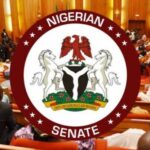The foregoing is my critique of the sort of constitutional, legal, practical and legitimacy challenges associated with referendum as a mechanism for resolving political-cum-constitutional questions. Clearly, in my view, there is no basis for it to feature in your deliberations or to give your committee sleepless nights. Your mandate to alter the existing document or replace it entirely must be undertaken in accordance with the provisions contained in and procedures envisioned by the 1999 Constitution.
Should you be persuaded to consider the use of referendum for the future, then you do need to amend the said constitution to address the many questions l raised above. You do need an enabling Act to spell out what sort of questions to submit for resolution via referendum, who is invested with power to conduct it, using what voters’ register, who is eligible to participate in it etc.
- World Bank counters FG, says 7m Nigerians plunged into poverty
- How Kaduna girls fight ‘period poverty’ with reusable pads
In 2018, the APC at National level established what it termed as the “Restructuring Committee, under the chairmanship of Gov Nasir el-Rufai. It came out with its report containing far-reaching recommendations on various aspects of the constitution, including accompanying draft bills for the NASS to give effect to its recommendations with enabling laws. I had occasion to express my views on the el-Rufai APC ad hoc Committee on Restructuring as it relates to referendum, devolution of powers, state police, the place of local government system, etc, and wish to share them with your committee. As you are urged to adopt its various recommendations, l wish to reiterate my observations and recommendations for your consideration.
State police
The report canvasses for the creation of state police and has proposed what it has considered necessary amendments to achieve this. The strongest argument in support of this position is that the introduction of state police will augur well for effective community policing, accords well with our federal system and will help fill the gap in the gross inadequacy of the federal police in numbers and funding. In any event, advocates argue, currently a heavy financial burden is borne by states in support of the Nigeria Police Force (NPF) in a manner that is unaccountable. Those who oppose state police point to the grave dangers of abuse of the institution, as experienced in the past. They harbour apprehension of its susceptibility to being manipulated to harass political opponents, ethnic minorities, etc. They caution against the emergence of militias controlled, armed and funded by states. Given our precarious situation in inter-ethnic and inter-religious relations, opponents of state police fear that local warlords may hijack it to further aggravate the precarious security situation in various communities across the nation. The foregoing appear to summarise the powerful arguments for and against the establishment of state police. Mallam Tanko Yakasai, a NEPU activist who had been on the receiving end of the yan doka (native police) and who had made powerful submission against state police, appears to be the lone voice which has been drowned by a crescendo of its support.
I would personally recommend the retention, maintenance and enhancement of the NPF.
However, in the light of the NPF’s inadequacy to provide effective policing in the face of the multi-faceted security and law and order challenges facing all communities across the nation, l would urge for the acceptance, in principle, of a community policing system with the following safeguards and guarantees:
- 1. Constitutional and strong federal legislative guarantees are needed to specify the extent and limit of community policing powers, the roles and mandate allowed for states and how the new institution will interface with the NPF and other securities agencies in its command and control structure and operations.
- 2. The federation shall retain the power to specify which types of arms and ammunition the community police may bear and veto powers as to deployment.
- 3. Recruitment of low and middle cadres of the NPF to be from locality and every effort must be made to ensure inclusiveness in recruitment.
- 4. Allow for the establishment of a community police force or the conversion of existing local institutions which must meet the stipulations contained above.
- 5. Limit community policing to detection and investigation of crime defined under local legislation, assistance with criminal justice system at community level, providing alternative dispute resolution mechanism, etc.
- 6. Consider converting FRSC, civil defence, traffic wardens to form part of the community police.
Recommendation
The relevant sections of the 1999 Constitution and the Police Act will need to be amended to allow for the establishment of state police. An act of NASS will need to be passed to embody the preconditions specified above and any other incidental matters. The police will need to be transferred from the exclusive to concurrent List.
Devolution of powers
The committee has not fully articulated its idea of devolution of powers. It merely went ahead to transfer some items from the exclusive legislative list to the concurrent list. In my considered view, this amounts to no more than allowing the two tiers to share such powers subject to the doctrine of covering the field which renders state laws subservient to federal acts. This means if you merely transfer a power from exclusive to concurrent, the state legislature’s power to make laws is subject to and limited by federal exercise.
I have noted the lists the committee recommended for transfer. Consequently, one views this to be a misconception of devolution as, in reality, powers simply “shared” are not “devolved” or “transferred”. In reality, the mere act of transfer of list leaves matters where they belong. In place of transfer of any number of lists, l would recommend that the idea of creating a third legislative list, to be called the state list, be seriously considered. In a way this new list will belong to states exclusively.
There is need for serious and dispassionate discussion by all stakeholders, not the NASS alone, to reach a consensus as to what such will comprise.
Be that as it may, l endorse the transfer of some, but have serious reservations against transferring others. I certainly do not support arms and ammunitions, foods, drugs and poison, census, ownership and operation of shipping to be put on concurrent or the new state list.
Recommendation
I recommend a thorough reexamination of the Second Schedule, both Parts l and ll of the the 1999 Costitution, to arrive at a consensus of all stakeholders as what items will form part of the new state list and what items will remain on the exclusive and concurrent lists.
Deletion of Local Government Councils (LGC) from constitution
While wrongly equating the LGC system to be the third federating unit, the report recommends for the deletion of LGCs from mention anywhere, particularly Section 3(6), 1st and 4th schedules, in the constitution, and Section 162 which makes provision for them in the revenue sharing formula.
I strongly oppose the deletion of LGC’s from the constitution.
I consider these recommendations to be totally unjustifiable. First, LGC’s participate in revenue sharing not because they are a federating unit, but because they are considered as a local administrative tier the establishment of which Section 7 has guaranteed. The section seeks to ensure their establishment, protect their democratic nature and enhance their autonomous existence. Secondly, they are the closest units of governance to the grassroots, which if properly protected, can serve as veritable institutions for local mobilisation and socio-economic development. Recommendations
Consequent upon foregoing observations, l would urge for the retention of all provisions made in the 1999 Constitution in respect of LGCs so as to ensure their existence and enhance their autonomy. We should do nothing to undermine that. If any problem arises pertaining to how they are created, their number, funding and structure, the particular section should be amended in the constitution, but not to delete the institution of the local government entirely from the constitution. Concluded
Yadudu, a Professor of law, submitted this memo at the sitting of the House of Representatives Committee on the Review of the 1999 Constitution, Kano Zonal Public Hearing.

 Join Daily Trust WhatsApp Community For Quick Access To News and Happenings Around You.
Join Daily Trust WhatsApp Community For Quick Access To News and Happenings Around You.


